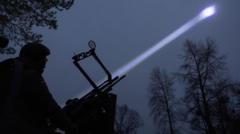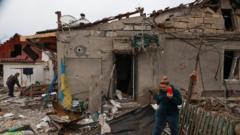The sustained conflict in Ukraine has not only led to physical casualties but also inflicted deep psychological scars on its populace.
Sleep Crisis in Ukraine: The Psychological Toll of War

Sleep Crisis in Ukraine: The Psychological Toll of War
As the war in Ukraine persists, sleep deprivation emerges as a national health crisis, exacerbated by ongoing drone strikes.
In the past year, 22-year-old Sofia Tsarenko found solace in drinking with friends as a way to cope, which eventually spiraled into anxiety and insomnia. Residing in Dnipro, she experienced a shift from relying on alcohol to using sleeping pills and antidepressants to find relief. "I felt like angels were taking me to sleep,” she said, highlighting the desperate measures citizens are taking during these tumultuous times.
The psychological consequences of the ongoing war are staggering. With thousands dead and many more injured, Ukraine faces a critical increase in mental health issues, especially due to nearly nightly drone attacks disrupting sleep across the nation. Recent U.S.-mediated peace talks have not alleviated this, as reports indicate an upsurge in drone strikes targeting urban centers, including a recent devastating attack in Kyiv.
Psychologists warn that chronic sleep deprivation, colloquially known as "sleep debt," can lead to severe mental health problems, including anxiety, irritability, and depression. The pervasive sounds of approaching drones and subsequent explosions create an atmosphere of heightened anxiety that continues to plague citizens long after each attack. The nation, thus, finds itself in a relentless battle not only against an external adversary but also against the internal struggles of sleepless nights and the psychological aftermath of sustained conflict.
The psychological consequences of the ongoing war are staggering. With thousands dead and many more injured, Ukraine faces a critical increase in mental health issues, especially due to nearly nightly drone attacks disrupting sleep across the nation. Recent U.S.-mediated peace talks have not alleviated this, as reports indicate an upsurge in drone strikes targeting urban centers, including a recent devastating attack in Kyiv.
Psychologists warn that chronic sleep deprivation, colloquially known as "sleep debt," can lead to severe mental health problems, including anxiety, irritability, and depression. The pervasive sounds of approaching drones and subsequent explosions create an atmosphere of heightened anxiety that continues to plague citizens long after each attack. The nation, thus, finds itself in a relentless battle not only against an external adversary but also against the internal struggles of sleepless nights and the psychological aftermath of sustained conflict.





















